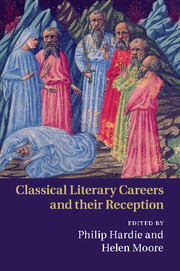Book contents
- Frontmatter
- Contents
- List of contributors
- Preface
- Note on the text
- Introduction: Literary careers – Classical models and their receptions
- 1 Some Virgilian unities
- 2 There and back again: Horace's poetic career
- 3 The Ovidian career model: Ovid, Gallus, Apuleius, Boccaccio
- 4 An elegist's career: from Cynthia to Cornelia
- 5 Persona and satiric career in Juvenal
- 6 The indistinct literary careers of Cicero and Pliny the Younger
- 7 Re-inventing Virgil's Wheel: the poet and his work from Dante to Petrarch
- 8 Did Shakespeare have a literary career?
- 9 New spins on old rotas: Virgil, Ovid, Milton
- 10 Bookburning and the poetic deathbed: the legacy of Virgil
- 11 Literary afterlives: metempsychosis from Ennius to Jorge Luis Borges
- 12 ‘Mirrored doubles’: Andrew Marvell, the remaking of poetry and the poet's career
- 13 Dryden and the complete career
- 14 Goethe's elegiac sabbatical
- 15 Wordsworth's career prospects: ‘peculiar language’ and public epigraphs
- Epilogue: Inventing a life – a personal view of literary careers
- List of works cited
- Index
5 - Persona and satiric career in Juvenal
Published online by Cambridge University Press: 10 November 2010
- Frontmatter
- Contents
- List of contributors
- Preface
- Note on the text
- Introduction: Literary careers – Classical models and their receptions
- 1 Some Virgilian unities
- 2 There and back again: Horace's poetic career
- 3 The Ovidian career model: Ovid, Gallus, Apuleius, Boccaccio
- 4 An elegist's career: from Cynthia to Cornelia
- 5 Persona and satiric career in Juvenal
- 6 The indistinct literary careers of Cicero and Pliny the Younger
- 7 Re-inventing Virgil's Wheel: the poet and his work from Dante to Petrarch
- 8 Did Shakespeare have a literary career?
- 9 New spins on old rotas: Virgil, Ovid, Milton
- 10 Bookburning and the poetic deathbed: the legacy of Virgil
- 11 Literary afterlives: metempsychosis from Ennius to Jorge Luis Borges
- 12 ‘Mirrored doubles’: Andrew Marvell, the remaking of poetry and the poet's career
- 13 Dryden and the complete career
- 14 Goethe's elegiac sabbatical
- 15 Wordsworth's career prospects: ‘peculiar language’ and public epigraphs
- Epilogue: Inventing a life – a personal view of literary careers
- List of works cited
- Index
Summary
VERSIONS OF THE SATIRIC CAREER
In discussions of Roman poets, the term ‘career’ is most often used in reference to authors who wrote in a variety of genres, such as Ennius, Virgil and Ovid. In the work of these poets, well-marked transitions from one genre to another adumbrate literary biographies of sorts. By contrast, the satiric poets, with the exception of the prolific and versatile Horace, are not described as having progressed through ‘careers’. This has several likely causes: the fact that most of the poets in question restricted themselves to satire, the different length and structure of each poet's contribution, differences among the authors' social and financial circumstances, the genre's strong associations with performance and the idea of the fictive persona, and the current interest in satire as social discourse. But the prominent constructed author figure and his commentaries on his environment, his memories and his aims, encourage us to consider satiric texts as stories about the author. Satire's characteristic subjectivity can be read as manifesting a ‘career consciousness’ in the generic formula. We may define the satiric career as the narrative that is strung together with even the briefest fictionalized portraits of the satirist figure, a narrative that posits an on-going and symbiotic relationship between the satiric text and the world that the poet inhabits and negotiates.
- Type
- Chapter
- Information
- Classical Literary Careers and their Reception , pp. 105 - 117Publisher: Cambridge University PressPrint publication year: 2010

